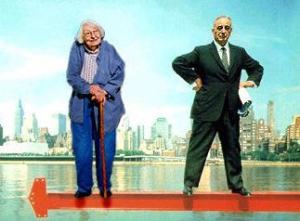 No matter how many times I have been to the Netherlands, how many times I have ridden next to parked cars, nor how many times as a driver have I leapt from my vehicle, in all that time and in all those places I never learned how do the Dutch get out of a car. But I should have and Russell Shorto explains why.
No matter how many times I have been to the Netherlands, how many times I have ridden next to parked cars, nor how many times as a driver have I leapt from my vehicle, in all that time and in all those places I never learned how do the Dutch get out of a car. But I should have and Russell Shorto explains why.
Sunday, July 31, 2011
Weekend reading: How do the Dutch get out of a car?
Friday, July 29, 2011
III. The Female Quotient. Women shaping the future of transport in cities: Who, how, where?
29 July interim progress report:
This off-the-cuff collaborative brainstorm is proving a pure learning experience. We started out with a single long-held idea: i.e., the importance of getting all  aspects of the sustainable transport planning and policy establishment on to a gender-level footing. And against that understanding we set out on Tuesday to see if we could, with a little help from our friends, come up with a convincing list identifying a certain number of outstanding women leaders working in our field who, though their excellent preparation, their strong convictions and their courageous pioneering actions, are literally redrawing the new mobility map (and the mental maps) of our cities. And all that at a level of excellence that captures the attention of others in other places, and inspires them to study, emulate and perhaps even to surpass the original project, approach and policies.
aspects of the sustainable transport planning and policy establishment on to a gender-level footing. And against that understanding we set out on Tuesday to see if we could, with a little help from our friends, come up with a convincing list identifying a certain number of outstanding women leaders working in our field who, though their excellent preparation, their strong convictions and their courageous pioneering actions, are literally redrawing the new mobility map (and the mental maps) of our cities. And all that at a level of excellence that captures the attention of others in other places, and inspires them to study, emulate and perhaps even to surpass the original project, approach and policies.
Thursday, July 28, 2011
Upcoming international events: Aug/Oct. 2011

A lista dos próximos eventos, colocados abaixo, a realizarem-se no final de Outubro, é fornecida por GIZ Sustainable Urban Transport Project. Clique aqui para ver o site e a última newsletter (de Maio - Junho de 2011).
II. The Female Quotient. Women Shaping the Future: What are the criteria for measuring impact?
There has been a refreshingly enthusiastic reaction to our posting yesterday asking about the general deficiency of information on women leaders in the field of sustainable transport in cities. But one note came in from the prolific environmental educator and recognized policy adviser Elizabeth Deacon challenging us in these exact words: "I assume you think there are in fact women who have had an impact. But I then must also assume that your comments have gone unheeded. At the same time, one has to wonder what the criteria are for measuring “impact” – do you know???" Fair question.
--> Read on:Wednesday, July 27, 2011
I. The Female Quotient. There are no women in the world who are shaping the sustainable transportation agenda? (Apparently)
I wonder if I am the only person in the world who gets upset at this: I am from time to time approached by groups and publications with in-progress lists identifying whom they see as the most influential people who are through their work and efforts shaping the sustainable transportation agenda, which they then ask me to comment, add to, etc. Now what is to me most striking about these lists is that on almost all occasions they invariably consist not only of outstanding people, but almost entirely of names of males.
I am from time to time approached by groups and publications with in-progress lists identifying whom they see as the most influential people who are through their work and efforts shaping the sustainable transportation agenda, which they then ask me to comment, add to, etc. Now what is to me most striking about these lists is that on almost all occasions they invariably consist not only of outstanding people, but almost entirely of names of males.
Saturday, July 23, 2011
Mile upon mile of emptiness
 We do not normally "do" roads here in the pages of World Streets, our primary focus, even fixation, being not on vehicles and highways but rather on streets and people. But we would be foolish to forget that making full and continuing full use of our peripheral vision is critical if we are ever to understand context and to be able to see broader patterns. So from time to time we do, usually with the help of others, have a look at the roads end of our business.
We do not normally "do" roads here in the pages of World Streets, our primary focus, even fixation, being not on vehicles and highways but rather on streets and people. But we would be foolish to forget that making full and continuing full use of our peripheral vision is critical if we are ever to understand context and to be able to see broader patterns. So from time to time we do, usually with the help of others, have a look at the roads end of our business.
Friday, July 22, 2011
Breathing the lovely morning air in Delhi traffic
--> Read on:
GUEST POST. "Anyone who has sat in traffic in an Indian city knows what it feels like to be blasted in the face by the exhaust of a neighboring vehicle. Despite the potentially important health risks that may be involved with such encounters, relatively few studies have measured in-traffic air pollution in developing world cities, where the combination of congested traffic and high-emitting vehicle fleets make "in-your-face" exposures a feature … Read More
Wednesday, July 20, 2011
Volvo Sustainable Mobility award: Any bright ideas?
Annoucement: The Volvo Sustainable Mobility award supports all groups, organizations,  institutes and individuals who are working towards creating ‘innovative solutions’ in the broad area of supporting sustainable transport in cities. The objective is to highlight the need to develop effective urban transport & mobility system to address the needs of rapidly growing cities. The last date for registering entries is August 30th 2011. The last date for submitting project details for the award is September 1st 2011.
institutes and individuals who are working towards creating ‘innovative solutions’ in the broad area of supporting sustainable transport in cities. The objective is to highlight the need to develop effective urban transport & mobility system to address the needs of rapidly growing cities. The last date for registering entries is August 30th 2011. The last date for submitting project details for the award is September 1st 2011.
India Streets: We must be doing something right.
Here is something that is rather interesting about India Streets. While for various reasons there have been very little orignal content coming in from our Indian colleagues in the last months, the fact is that the journal is nonetheless quite heavily visited each day. And where do those readers come from? India Streets: We must be doing something right. (Now all we have to do is do more and better of it. That is where you get involved. And you … Read More
via The Streets of India --> Read on:
Tuesday, July 19, 2011
"Worst Practices": Regulations that prohibit shared taxis anywhere on the planet
 "Regulations that prohibit shared taxis are an example of worst practice."
"Regulations that prohibit shared taxis are an example of worst practice."
- Ann Hackett
--> Read on:
Monday, July 18, 2011
"Worst Practices". Los Angeles on the rocks
It's a fine thing of course to know about "best practices" in our troubled sector, and there  are quite a number of programs and sources in various corners of the world that are busy assembling these and making them available in various databases. That is excellent. But we decided that World Streets can make a useful contribution if we take all this from the other end -- and launch a series of collaborative "worst practice" (or possibly just "bad practice") profiles, illustrating different ways to get it very wrong.
are quite a number of programs and sources in various corners of the world that are busy assembling these and making them available in various databases. That is excellent. But we decided that World Streets can make a useful contribution if we take all this from the other end -- and launch a series of collaborative "worst practice" (or possibly just "bad practice") profiles, illustrating different ways to get it very wrong.
Friday, July 15, 2011
Move over climate change: air pollution is the new issue in town
 The UK's air quality and pollution has climbed back up the environmental agenda after years of inactivity. Here are some possible reasons why. (From today's Guardian )
The UK's air quality and pollution has climbed back up the environmental agenda after years of inactivity. Here are some possible reasons why. (From today's Guardian )
Tuesday, July 12, 2011
Toward a new paradigm for transport in cities: Let's see what Carlos Pardo has to say
The Stuttgart conference of Cities for Mobility this year represented an  important step forward in the construction of a well-defined agenda for new mobility that up until the present time has been sadly lacking. But what we have managed to develop over the last two decades is a certain number of basic principles spanning many different areas and kinds of operational situations, but somehow until now we have failed to put them all together into a well-defined, convincing operational and policy package. We think of this as the move toward a new paradigm for transport in cities – and it all starts with . . . slowing down.
important step forward in the construction of a well-defined agenda for new mobility that up until the present time has been sadly lacking. But what we have managed to develop over the last two decades is a certain number of basic principles spanning many different areas and kinds of operational situations, but somehow until now we have failed to put them all together into a well-defined, convincing operational and policy package. We think of this as the move toward a new paradigm for transport in cities – and it all starts with . . . slowing down.
On the importance of “sustainable development”
In the context of the seminar that I am in the process of completing for a class of graduate MBA students of the Institut Supérieur de Gestion, I have just this morning sent them the following small questionnaire that I hope they will be able to whip through in 5 minutes or so. (Also if you would like to share your views on any of this, that would be terrific. I can then try to factor them also into the final round.) Sustainable Development, Ente … Read More
via Sustainable Development, Enterprise & Society
--> Read on:Sunday, July 10, 2011
Why people do what they do? And why it's important for us to understand.
David Brooks is a columnist for the New York Times, generally a  mid-American Conservative with all that implies. But he can surprise. Today he took a whack at the convolute matters of cognition, context and eventually the choices we make. From the vantage of our sector of responsibility here, if we are not able to operate at this level of cerebralilty, we will never make the transition to not just an "examined society" but also a sustainable world. So we better start making better use of the space in the back of our brains as well.
mid-American Conservative with all that implies. But he can surprise. Today he took a whack at the convolute matters of cognition, context and eventually the choices we make. From the vantage of our sector of responsibility here, if we are not able to operate at this level of cerebralilty, we will never make the transition to not just an "examined society" but also a sustainable world. So we better start making better use of the space in the back of our brains as well.
Friday, July 8, 2011
SLOWTH: Or why it is so very important (and so very easy) to slow down traffic in cities
 It is the consistent position of this journal that much of what is wrong with our current transportation arrangements in cities could be greatly alleviated if we can find ways just to slow down. It is very powerful -- and it's just not that hard to do. Get comfortable and have a look.
It is the consistent position of this journal that much of what is wrong with our current transportation arrangements in cities could be greatly alleviated if we can find ways just to slow down. It is very powerful -- and it's just not that hard to do. Get comfortable and have a look.
Monday, July 4, 2011
Friday, July 1, 2011
Best transport research database we have ever seen.
 The overflowing inbox this morning brought a reminder of a tool to which in this age of info-overload we had not given much thought of late - the expanded and honed TRID database. This is not just a good database and handy resource -- it is an EXCELLENT tool for planners, policy makers, academics, and quite possibly you. If you are not already using it, at the very least check out the quick presentation here. We shall shortly publish a more complete critical introduction to this excellent transportation research resource. In the meantime, here is a quick intro and key to putting it to work.
The overflowing inbox this morning brought a reminder of a tool to which in this age of info-overload we had not given much thought of late - the expanded and honed TRID database. This is not just a good database and handy resource -- it is an EXCELLENT tool for planners, policy makers, academics, and quite possibly you. If you are not already using it, at the very least check out the quick presentation here. We shall shortly publish a more complete critical introduction to this excellent transportation research resource. In the meantime, here is a quick intro and key to putting it to work.



